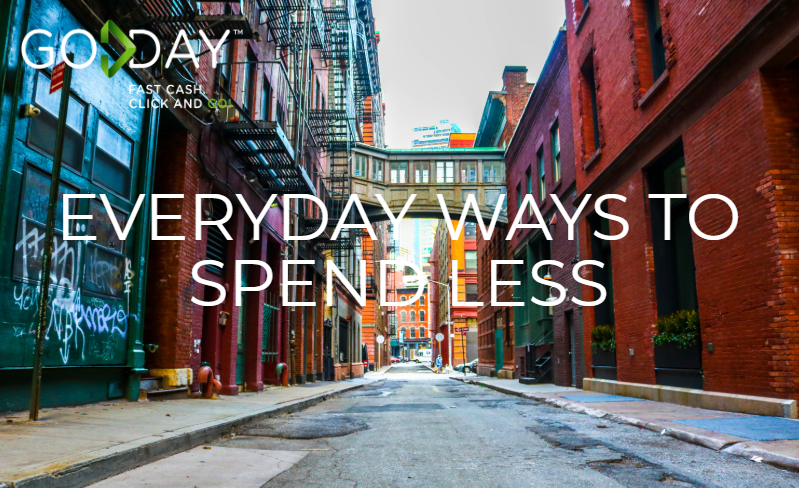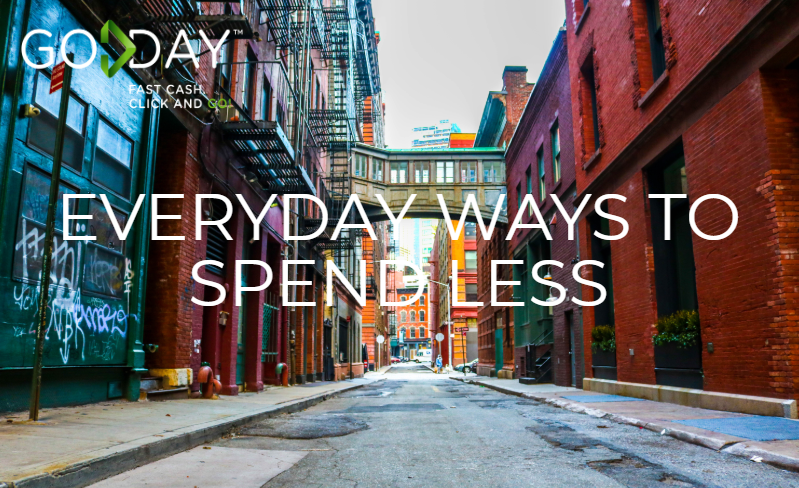
We’re always looking for ways to help save you money and sometimes that means helping you start fresh or even find everyday ways to spend less. And we know that getting your finances in order can be tricky. It’s never as simple as we want it to be. However, there are common mistakes we can avoid when it comes to our money and ways to simplify your finances.
That is why GoDay is here for you. Whether you are looking to get back on track with your finances or need help with an unexpected financial situation, GoDay can get you the cash you need, quickly and easily and provide financial education information for you along the way. That’s why we are sharing our favourite tips to help you save more and spend less below.
Budget, budget, budget
There is a common theme in many of our blog posts – budgeting. That is because it is so important to have some kind of budgeting system in place; especially when it comes to looking for everyday ways to spend less. When your expenses exceed your income you know that it is time to re-evaluate your money matters.
Many people have different budgeting goals and various ways to stay on top of their finances. Are you looking to stay on track? Have you been going over your budget lately? Are you looking to analyze your budget to see where you could be saving more money and spending less? No matter, having a budget in place is always your first step.
So what does budgeting mean for someone who is trying to spend less? You want to be able to see where your money is and where it goes. However, many people feel it is a lot of work tracking money all the time. Others have no idea where to start, and that’s okay. One of the most common questions when it comes to starting a budget is “where do I start”?
How to Start Budgeting
Unfortunately, there is no single answer. It is about what works for you. Each person will have their preferred tracking system or budget that works best for them. The point is you need to start with some system and experiment until you get the right fit.
If you are looking at trying to spend less and save more, you may need to take a step back and focus on your spending habits. This can reveal specific things you can cut down on or eliminate from your budget. Without some sort of budget or tracking system, you’ll have no idea how you can create a livable budget to improve your spending habits.
Luckily, we’re here to offer you a few suggestions on methods that can help you understand your current finances, set yourself up for success, and create a budget that works for you. Try a few of these common budgeting tools:
- Excel spreadsheet
- Mobile apps (Mint, Wally, Pocket Guard and more)
- Spending journal
- Receipt tracker
- Specialized budgeting software
- In-house tools from your bank
Say Goodbye to Bad Spending Habits
If you want to say goodbye to bad spending habits you need to learn how to make better spending decisions. We have all heard of the saying, “money can’t buy happiness”, but it can feel pretty good to spend money.
Call them what you like – guilty pleasures, impulse purchases, spending sprees, we have all been there. It is these kinds of spending habits that you need to break. However, you also need to realize that you aren’t the only one with bad spending habits. Don’t waste your energy feeling guilty. Instead, recognize how you are spending and take the next steps to change your thinking
Many people have no idea where there money has gone. It just dwindles away and they’re left waiting for their next pay cheque. Luckily, once you get a handle on your spending, bad spending habits become glaringly obvious. You’ll be able to see where changes need to be made.
What are bad spending habits you should focus on breaking?
- Impulse purchases: Are you one of those people that rarely reads the price tag? You just see something and decide to buy it. Retailers depend on impulse buyers and entice them with ads, in-store displays, and “specials”, that may not be that special at all. Plan what you’re going to buy and stick to your list to avoid impulse purchases.
- Treating yourself: a person can spend a great deal of money “treating themselves”, while claiming it is justified as they deserve it and it makes them feel better. The problem is that these expenses usually aren’t included in their budget. Of course, they might make you feel good at the moment. However, not so much when you have to pay your credit card bill or you need to cut back on something else later. You can certainly treat yourself occasionally, but include the expense in your budget.
- Paying for convenience: many people are willing to pay a premium for something that makes their life easier. That’s okay, but you have to keep your budget in mind. If you’re constantly paying for takeout or delivered meal packages, it can have a huge impact on your budget.
Start Saving Automatically
Bad spending habits can often lead to bad savings habits. Fortunately, if you improve your spending habits you’ll also have more money to save!
One of the easiest ways to switch things up is through automatic savings. You’re less likely to spend money on other things if you send a certain amount into a savings or investment account instead.
Of course, we understand that saving needs to become a habit. The first step is to open a savings account. This account should be separate from your everyday spending or chequing account. Why? Because when you are putting all your money into one account, it can be easy to spend your money on whatever, whenever. Plus, you won’t see your savings account growing, which can be a huge incentive.
If you are also one of those people that feel like you have spent your pay cheque almost as soon as it hits your bank account, this is one of the best ways to force yourself to save. Automatic payments to a savings account on pay day forces you to live on the new, lower amount. Start small and you probably won’t even notice the difference. If this tactic works for you, increase the amount when you feel ready.
More Tips To Spend Less
Stick to Cash or Debit
Another tip to spending less is to only use your debit card or cash, not a credit card. If you’re trying to tackle debt, using a credit card can cause you to fall off-budget if you don’t track your purchases. A lot of people are surprised at the end of the month when they see their credit card statement and realize how much money they’ve actually been spent.
This is why we recommend using cash and debit. It helps keep track of your spending. According to a Bankrate survey, older consumers are more likely to carry plastic. Only one in three millennials carry credit cards. If they do choose to carry a card, it tends to be prepaid or just a debit card. Perhaps older consumers could learn a thing or two from their spending habits.
Know the Difference Between Wants Versus Needs When Spending
There is no question that it is much easier to spend money on things that we want and things we “believe” we need. Who wants to go on a beach vacation? What about a new car? Who doesn’t want the latest and greatest technology? The list goes on.
Of course, these things don’t have to fall under the “want” category if you save and budget accordingly. However, when it comes down to these things or paying your monthly bills on time, your financial obligation must be your bills.
We live in a society where the latest gadget is a “must have”. Brand marketing makes us feel we “need” these things too. Nonetheless, this is often the reason for overspending and debt. We’ve become accustomed to things that we don’t actually need.
When creating a budget or looking for ways to spend less money, it is about financial priorities. If you consider the latest iPhone an absolute must have, you’d better budget for it.
Know Your Financial Means
Would you be surprised if we told you that more and more Canadians are getting into more debt than ever before? Apparently, living within our financial means is not the norm.
Living within your means is not easy, if you have unreal expectations. You certainly can’t own the latest gadgets, a new car, and a home if you don’t earn a substantial wage.
Unfortunately, many people don’t track how much they put on their credit cards each month. When they receive the bill, they make the minimum payment and interest compounds on the balance. Basically, you end up paying interest on interest, which can make it very difficult to eliminate your debt.
According to Statistics Canada, Canadians are burdened with historically high levels of household debt. Simply put, too many people are spending more than they earn. However, anyone can experience an unexpected financial setback. That’s when GoDay can help. We can provide you with money until your next paycheck, and we offer resources to help you along the way so you can get back on track.
Wanting to spend less and save more should be one of everyone’s financial goals. If you lose track of your spending or fall off your budget, GoDay can help you get back on track. But when it comes down to it, it’s all about you and your spending habits. Are you willing to cut items out of your budget to ensure that you are spending less and saving more?
GoDay is always looking for ways to help you meet your financial goals. If you’re in a bind, visit our website to discover how to get a payday loan today.



